Climate resilience for urban street vendors
- Proposed areas of implementation
- Potential areas of implementation
Project Partner
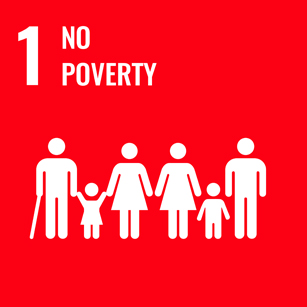
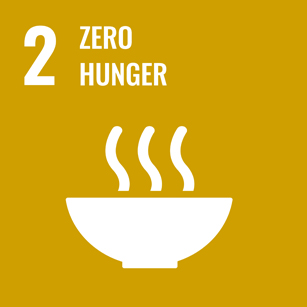
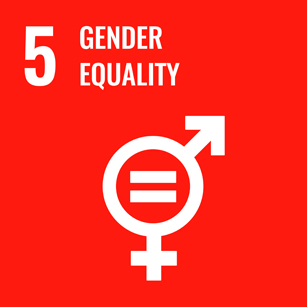
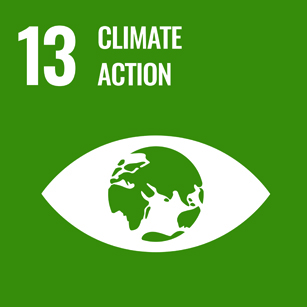
Street vendors encounter substantial climate-related risks, including heatwaves, pollution, and waterlogging, directly impacting their livelihoods. These risks lead to shorter working hours, health problems, and the loss of perishable goods, jeopardising their income and overall means of living.
Hunnarshala Foundation’s project aims to build the resilience of 400 street vendors in the city of Bhuj, in Kutch District, Gujarat by introducing climate-resilient infrastructure in six street vending zones across the city. The project not only focuses on implementing street vending zones and providing essential services in accordance with the Street Vendors Act (SVA), 2014 but also aims to use low-carbon, climate-resilient materials, innovations, and techniques for the infrastructure.
To ensure inclusivity and ownership in the implementation process, the project follows a participatory approach, involving stakeholders, including street vendors. It also has a provision for capacity building for the street vendors to effectively implement, operate, and maintain the climate-resilient infrastructure.
Context
Street vendors play a vital role in India’s urban retail and distribution system, comprising approximately 11% of the urban workforce. The street vending economy itself generates a parallel turnover of around INR 80 crores per day. However, despite their significant contribution, street vendors encounter various challenges in their work, which are further compounded by climate-related risks associated with working outdoors for long hours. These risks include extreme heat, waterlogging, and pollution.
Studies have revealed that rising temperatures result in reduced working hours, exhaustion, loss of perishable goods (such as fruits, vegetables, flowers, and eatables), and lower incomes for vendors. Moreover, vendors inhale dust from roads, nearby factories, ongoing construction etc, negatively affecting their health. For instance, in Delhi, 65% of street vendors reported breathing difficulties, and 70% experienced eye irritation, highlighting not only the pollution they face but also exposing them to the hazards of climate-related slow onset (such as heat stress) and extreme events (such as heavy rains and flooding). Heavy rains and flooding, worsened by climate change, disrupt sales and cause a loss of perishable goods. For example, street vendors were severely impacted by the floods in Chennai in 2015. This not only affects vendors’ income but also limits food availability, particularly in low-income communities relying on fresh markets and small food vendors.
Other challenges that contribute to uncertainty in the vending business include:
-
- Poor infrastructure at vending zones
- Lack of access to formal credit and financial services
- Inadequate social protection
- Illegal extortion schemes
Regarding infrastructure, a study by the National Association of Street Vendors of India (NASVI) found that most street vendors have limited access to basic services such as water, sanitation, and healthcare. Additionally, pre-existing socio-economic factors like poverty, limited education, and a lack of productive assets increase the vulnerability of street vendors. While the Prime Minister’s Street Vendor’s Atma Nirbhar Nidhi, a micro-credit program launched during and after the COVID-19 pandemic, provided some relief by offering working capital loans of up to INR 10,000 to affected street vendors, many challenges remain unresolved.
These issues are also prevalent in Bhuj city, located in Gujarat. Bhuj, the municipality and district headquarters of Kutch district, has a thriving street vending culture. However, street vendors in Bhuj have faced numerous hardships, especially after the 2001 earthquake. The subsequent city redevelopment led to the displacement of many street vendors without adequate compensation or alternative vending locations.
Furthermore, Bhuj is prone to climate-induced risks such as heatwaves and waterlogging, that affect the livelihoods of street vendors adversely and create unsafe working conditions. Addressing these challenges requires a comprehensive approach that provides legal recognition and protection to street vendors, improves access to basic services, and integrates climate resilience strategies into urban planning and development.
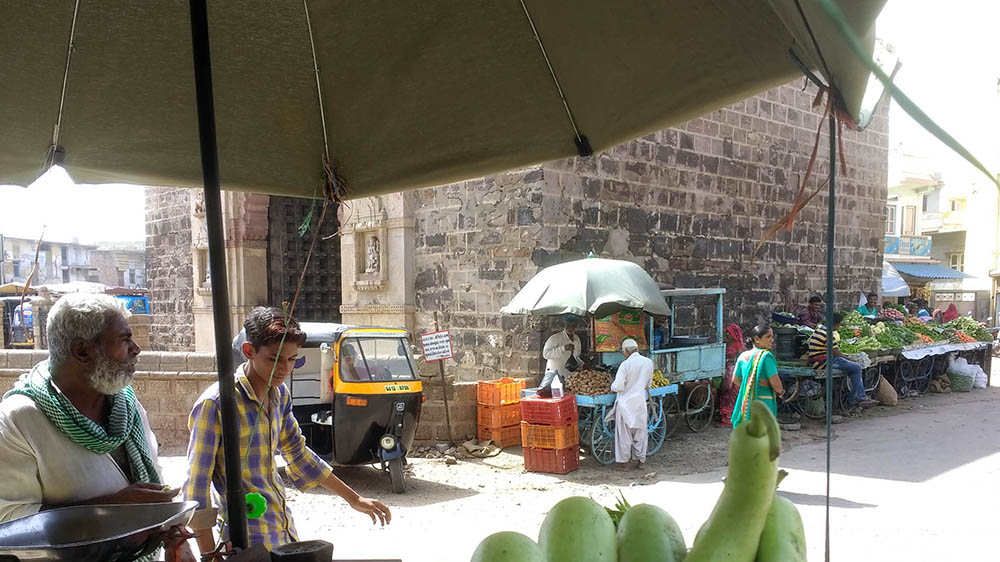
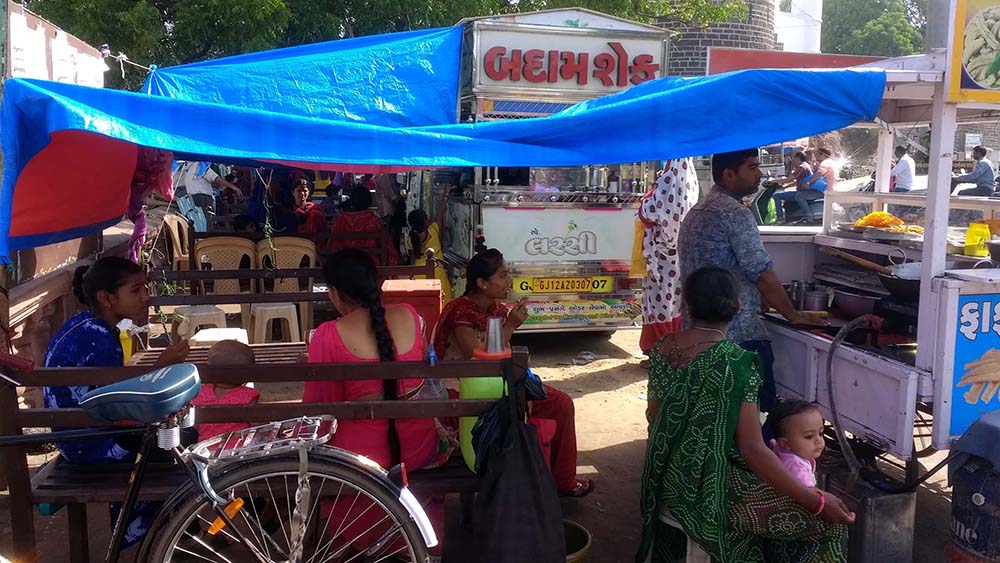
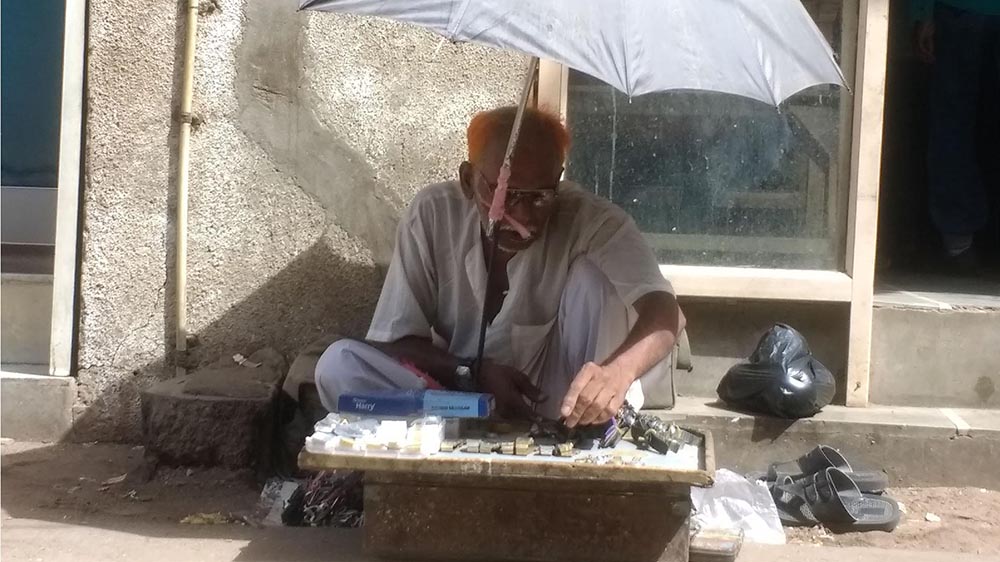
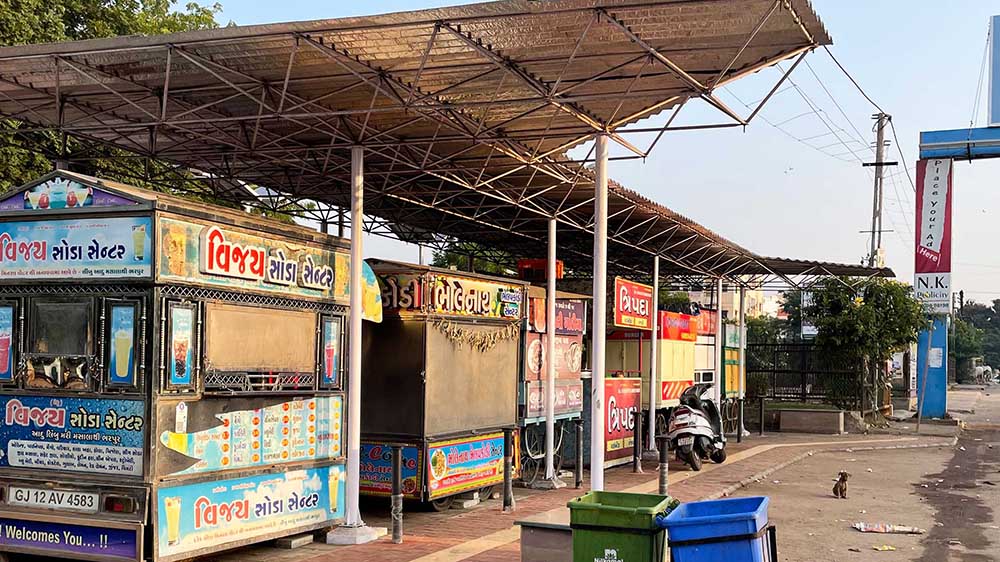
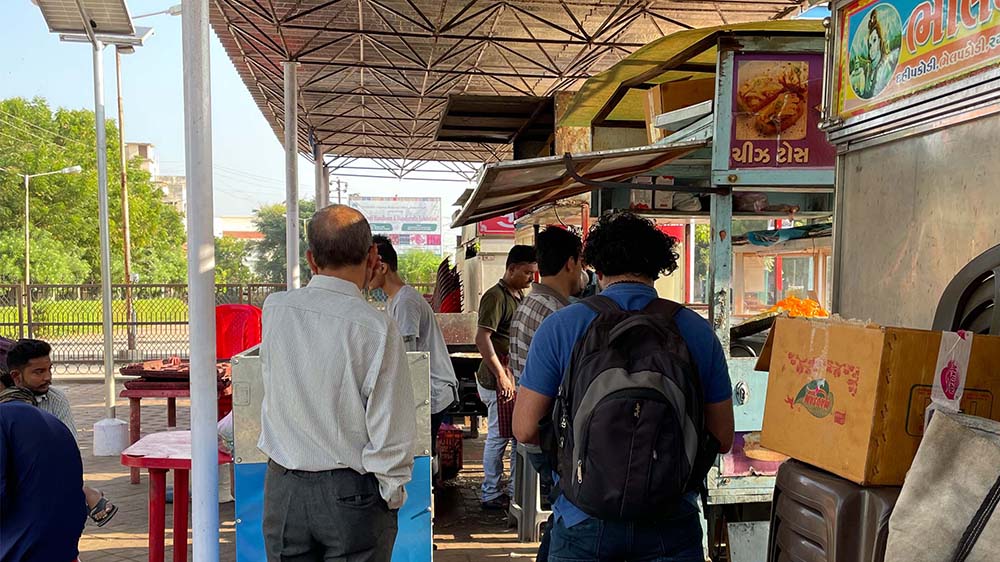
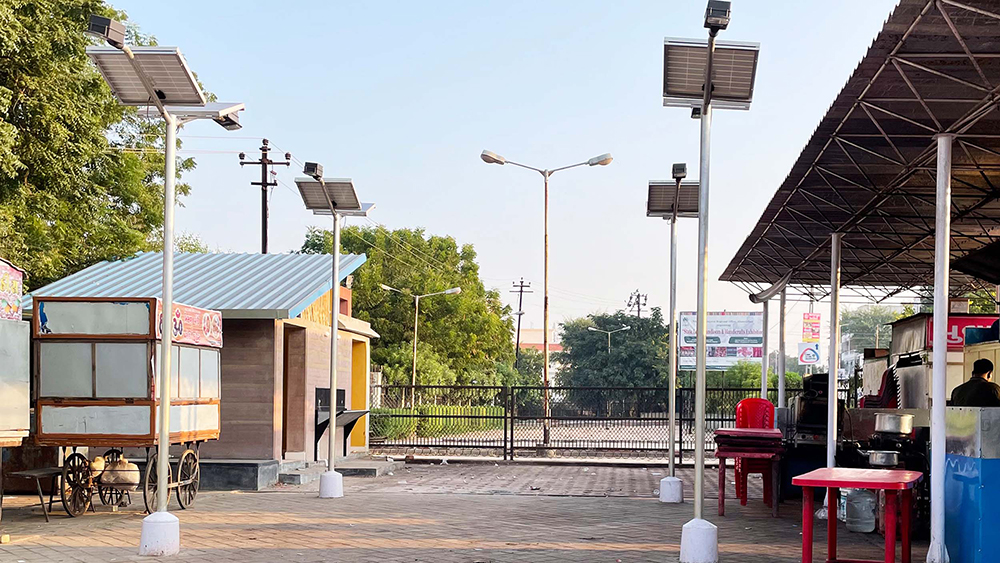
Problem statement
Street vendors make up nearly 2.5% of India’s urban population, accounting for approximately 10 million individuals and constituting around 11% of urban workers. Despite their significant presence, street vendors face a multitude of challenges, including lack of legal recognition, poor infrastructure, limited access to finance, occupational health and safety concerns, and gender-based discrimination. In addition to these challenges, street vendors also endure harsh weather conditions as they work long hours without adequate protection. They are exposed to high levels of vehicular pollution along roadsides and are particularly susceptible to extreme heat, exacerbated by the urban heat island effect. Climate change further exacerbates these risks, with rising average temperatures, extended heatwaves, unpredictable rainfall, and extreme precipitation events. These factors not only reduce operational hours and incomes for street vendors, but also have adverse effects on their health.
Bhuj, located in Gujarat’s Kutch district, is no stranger to extreme climatic conditions. The region falls within a hot and dry (or semi-arid) climatic zone, with significant daily temperature variations, reaching up to 20°C at times. During the long and dry summers, maximum temperatures often soar up to 48°C. In February 2023, when most parts of the country were slowly transitioning from winter to summer, the day temperature in Bhuj city was already over 40°C, the highest for February in at least 12 years. Further, heatwaves and droughts are common occurrences in Kutch district. Data from the Indian Meteorological Department (IMD) has shown the increasing frequency of occurrence of heatwaves over the last 30 years; between 1994 and 2010, heatwaves in Bhuj occurred once every 4 years on average, but between 2010 and 2022, there were 9 heatwaves, or one every 1.3 years. While rainfall in Kutch is traditionally lower compared to other parts of the country, in the past 30 years, there has been an increase in the frequency of rainy days during the monsoon season in the district. These extreme climatic conditions have a profound impact on the lives and livelihoods of informal sector workers, particularly street vendors, who work approximately 11 hours per day with limited weather protection. Studies and surveys highlight the lack of resources among informal sector workers to effectively mitigate these climatic stresses in a sustainable manner.
In 2021 Bhuj formed an active Town Vending Committee (TVC) that comprises of all stakeholders relevant to the street vending profession (street vendor associations, resident welfare associations, municipal officials)—as mandated by the Street Vendors Act (SVA), 2014, becoming the second city after Ranchi to do so. However, clear byelaws and urban design guidelines for the development of vending zones were not established, falling short of the requirements of the Street Vendors Act (SVA) of 2014. To address this gap, the local Street Vendors’ Federation—which was established in 2017 with the objective to represent the interests of the street vendors of Bhuj at the city (and state) level—in partnership with Hunnarshala Foundation, developed a pilot model vending zone in Bhuj’s Bhanushali Nagar, which in addition to incorporating basic amenities, also integrated low-carbon materials, and climate-resilient technologies. The success of the pilot project led to the demand for similar zones in other parts of the city.
While the pilot project demonstrated success, greater collaboration with local and state governments is necessary to implement street vending zones that comply with the SVA and provide essential services to vendors. Given the increasing impacts of climate change, including rising heatwaves and monsoon rain in Bhuj, it is crucial to acknowledge the climate risks faced by street vendors and integrate climate-resilient strategies into urban planning and development.
Goals and objectives
Implemented by Hunnarshala Foundation, this project aims to enhance the resilience of street vendors in Bhuj city, Gujarat, to climate-related risks such as heatwaves, pollution, and waterlogging. It seeks to achieve this by introducing low-carbon, climate-resilient infrastructure, technologies, and practices in street vending zones. The project also aims to establish climate-resilient prototypes for street vending zones, serving as examples to guide state-level policy interventions. The specific objectives of the project include:
- Building resilience of street vendors to climate extremes like heatwaves and heavy rainfall during their working hours to protect their livelihoods.
- Promoting low-carbon, climate-smart infrastructure, technologies, and practices in street vending zones to ensure sustainable development.
- Enhancing awareness and capacity-building of street vendors and other stakeholders regarding the SVA 2014, facilitating better access to the services and benefits provided under the Act.
- Developing on-ground prototypes to showcase viable solutions that can be implemented in street vending zones, thereby informing state-level policy decisions.
About the organisation
Hunnarshala Foundation emerged in response to the 2001 earthquake in Kutch, aiming to empower communities in rebuilding their habitats. Recognizing the value of combining traditional wisdom with scientific building science for sustainable development, Hunnarshala bridged the gap between the two and involved artisans in delivering high-quality buildings and community spaces. Their applied research highlighted the importance of understanding technology and the people and places involved for effective knowledge transfer.
With a diverse group of around 80 shareholders, Hunnarshala promotes sustainable development and specializes in building design, social housing, and disaster reconstruction. They prioritize community participation and adopt environmentally conscious approaches to foster inclusive development.






